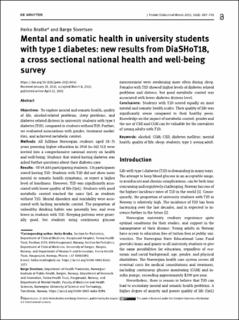| dc.contributor.author | Bratke, Heiko Holger Karl-Ernst | |
| dc.contributor.author | Sivertsen, Børge | |
| dc.date.accessioned | 2021-10-12T07:48:27Z | |
| dc.date.available | 2021-10-12T07:48:27Z | |
| dc.date.created | 2021-06-21T10:41:53Z | |
| dc.date.issued | 2021 | |
| dc.identifier.citation | Journal of Pediatric Endocrinology & Metabolism (JPEM). 2021, 34 (6), 697-705. | en_US |
| dc.identifier.issn | 0334-018X | |
| dc.identifier.uri | https://hdl.handle.net/11250/2789147 | |
| dc.description.abstract | Objectives
To explore mental and somatic health, quality of life, alcohol-related problems, sleep problems, and diabetes related distress in university students with type 1 diabetes (T1D), compared to students without T1D. Further, we evaluated associations with gender, treatment modalities, and achieved metabolic control.
Methods
All fulltime Norwegian students aged 18–35 years pursuing higher education in 2018 (n=162.512) were invited into a comprehensive national survey on health and well-being. Students that stated having diabetes was asked further questions about their diabetes care.
Results
Of 49,684 participating students, 324 participants stated having T1D. Students with T1D did not show more mental or somatic health symptoms, or report a higher level of loneliness. However, T1D was significantly associated with lower quality of life (QoL). Students with good metabolic control reached the same QoL as students without T1D. Mental disorders and suicidality were associated with lacking metabolic control. The proportion of unhealthy drinking habits was generally low, and even lower in students with T1D. Sleeping patterns were generally good, but students using continuous glucose measurement were awakening more often during sleep. Females with T1D showed higher levels of diabetes related problems and distress, but good metabolic control was associated with lower diabetes distress level.
Conclusions
Students with T1D scored equally on most mental and somatic health scales. Their quality of life was significantly worse compared to their healthy peers. Knowledge on the impact of metabolic control, gender and the use of CSII and CGM can be valuable for the caretakers of young adults with T1D. | en_US |
| dc.language.iso | eng | en_US |
| dc.publisher | De Gruyter | en_US |
| dc.rights | Navngivelse 4.0 Internasjonal | * |
| dc.rights.uri | http://creativecommons.org/licenses/by/4.0/deed.no | * |
| dc.title | Mental and somatic health in university students with type 1 diabetes: New results from DiaSHoT18, a cross sectional national health and well-being survey | en_US |
| dc.type | Peer reviewed | en_US |
| dc.type | Journal article | en_US |
| dc.description.version | publishedVersion | en_US |
| dc.source.pagenumber | 697-705 | en_US |
| dc.source.volume | 34 | en_US |
| dc.source.journal | Journal of Pediatric Endocrinology & Metabolism (JPEM) | en_US |
| dc.source.issue | 6 | en_US |
| dc.identifier.doi | 10.1515/jpem-2021-0041 | |
| dc.identifier.cristin | 1917176 | |
| cristin.ispublished | true | |
| cristin.fulltext | original | |
| cristin.qualitycode | 1 | |

